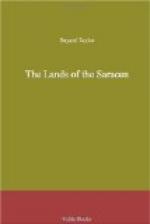The famous Damascus blades, so renowned in the time of the Crusaders, are made here no longer. The art has been lost for three or four centuries. Yet genuine old swords, of the true steel, are occasionally to be found. They are readily distinguished from modern imitations by their clear and silvery ring when struck, and by the finely watered appearance of the blade, produced by its having been first made of woven wire, and then worked over and over again until it attained the requisite temper. A droll Turk, who is the shekh ed-dellal, or Chief of the Auctioneers, and is nicknamed Abou-Anteeka (the Father of the Antiques), has a large collection of sabres, daggers, pieces of mail, shields, pipes, rings, seals, and other ancient articles. He demands enormous prices, but generally takes about one-third of what he first asks. I have spent several hours in his curiosity shop, bargaining for turquoise rings, carbuncles, Persian amulets, and Circassian daggers. While looking over some old swords the other day, I noticed one of exquisite temper, but with a shorter blade than usual. The point had apparently been snapped off in fight, but owing to the excellence of the sword, or the owner’s affection for it, the steel had been carefully shaped into a new point. Abou-Anteeka asked five hundred piastres, and I, who had taken a particular fancy to possess it, offered him two hundred in an indifferent way, and then laid it aside to examine other articles. After his refusal to accept my offer, I said nothing more, and was leaving the shop, when the old fellow called me back, saying: “You have forgotten your sword,”—which I thereupon took at my own price. I have shown it to Mr. Wood, the British Consul, who pronounced it an extremely fine specimen of Damascus steel; and, on reading the inscription enamelled upon the blade, ascertains that it was made in the year of the Hegira, 181, which corresponds to A.D. 798. This was during the Caliphate of Haroun Al-Raschid, and who knows but the sword may have once flashed in the presence of that great and glorious sovereign—nay, been drawn by his own hand! Who knows but that the Milan armor of the Crusaders may have shivered its point, on the field of Askalon! I kiss the veined azure of thy blade, O Sword of Haroun! I hang the crimson cords of thy scabbard upon my shoulder, and thou shalt henceforth clank in silver music at my side, singing to my ear, and mine alone, thy chants of battle, thy rejoicing songs of slaughter!
Yesterday evening, three gentlemen of Lord Dalkeith’s party arrived from a trip to Palmyra. The road thither lies through a part of the Syrian Desert belonging to the Aneyzeh tribe, who are now supposed to be in league with the Druses, against the Government. Including this party, only six persons have succeeded in reaching Palmyra within a year, and two of them, Messrs. Noel and Cathcart, were imprisoned four days by the Arabs, and only escaped by the accidental departure




